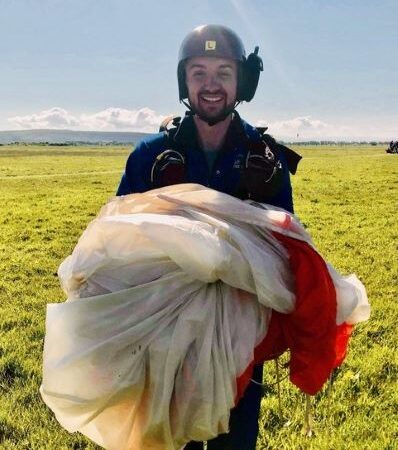Looking for inspiration on how your career in the Space sector could take off? Ben Johnson, 2019 alumnus, MSc in Neuropsychology, tells us about his varied career journey and provides excellent advice on how to gain experience while at university.
Over to Ben… my career journey
Image caption: Ben after his first parachute jump with Edinburgh University Skydiving Club – a great opportunity (along with Gliding Club) for aerospace enthusiasts.
I first got interested in working in the space sector through attending a youth space camp. From there I wasn’t able to have many opportunities until my undergraduate degree at Georgetown University in Washington, DC, when I started working as an assistant in the laboratory of astrobiologist Dr Sarah Johnson. I was able to write an undergraduate biology dissertation with her on changes in the human microbiome in isolated spaceflight analogues, which led to me working as an intern at NASA’s Johnson Space Center in Texas.
From there, I was able to come to University of Edinburgh to complete my MSc in Neuropsychology. My personal tutor was very flexible in accommodating my interest in space research, and paired me with Professor Thomas Bak who had just finished supervising a PhD student in the psychology of the Arctic. Together, we shaped my MSc dissertation to use data from the Antarctic to answer questions about how teams of people work together in situations of extreme isolation such as near the South Pole or in space.
Writing my MSc dissertation at Edinburgh on the psychology of extreme environments allowed me to apply for a masters degree in space physiology in London, which I completed the year after. Now, I am in a graduate entry medicine track, planning to become an aviation and space medicine physician.
Current work
I am currently involved in multiple areas of space research that build on the skills I learned at University of Edinburgh. The psychology department gave me a thorough training in statistics which has proven immeasurably useful in working on research teams, as statistical proficiency is a highly sought after skill. I have been able to use my psychology degree to join a lab group in the John Hopkins Armstrong Institute which is studying how to provide mental health analysis software to support future long duration space exploration.
Advice on how to get started and build experience
For students who are interested in pursuing a career in space I would advise being transparent about that interest and approaching personal tutors and professors early with it. You might not think there is an opportunity available until you ask!
Additionally, I would make sure to get involved with great space related students’ groups at the University and around the country such as: UK Students for the Exploration and Development of Space (UKSEDS), Space Generation Advisory Council (SGAC), the Royal Aeronautical Society, and the Edinburgh University Physics and Astronomy Society.
Thanks Ben for such great advice on how to get involved in this exciting sector.


